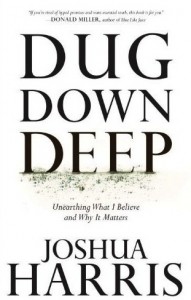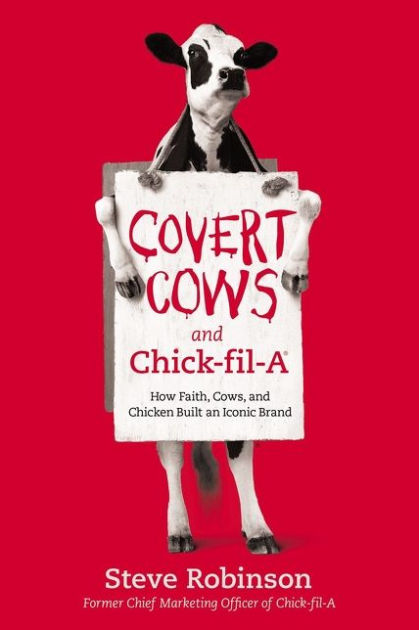Last week I had a chance to do some reading since we were off on Friday. I have read several of Joshua Harris’ books including I Kissed Dating Goodbye, Boy Meets Girl, and Stop Dating the Church. I was able to get a copy of Dug Down Deep for free from the blogger review program at WaterBrook Multnomah. The premise of this book is to help the reader understand why it matters what we believe.
I didn’t grow up in church for the most part. I became a Christian at the age of 15 and have always felt like I was playing a bit of a catchup game in establishing an understanding of doctrine. This book really digs in to doctrinal issues that are critical to understand. This book covers what I would describe as my “hills to die on” particularly related to salvation, forgiveness, and eternity.
This book is great for students of all ages that want to dig deeper in their walk with the Lord. I am thankful for Josh Harris and his willingness to take the time to take on this project. Below you will see the things I highlighted in the book.
- “We’re all theologians. The question is whether what we know about God is true.”
- “Blaming the church for our problems is second only to the popular and easy course of blaming our parents for everything that’s wrong with us.”
- “This story scares me because it shows that it’s possible for a whole generation to go happily about the business of religion, all the while having lost a true knowledge of God.”
- “I’ve come to learn that theology matters. And it matters not because we want a good grade on a test but because what we know about God shapes the way we think and live. What you believe about God’s nature – what he is like, what he wants from you, and whether or not you will answer to him – affects every part of your life.”
- “We’re either building our lives on the reality of what God is truly like and what he’s about, or we’re basing our lives on our own imagination and misconceptions.”
- “We’re all theologians. The question is whether what we know about God is true.”
- “In the context of Christian faith, orthodoxy is shorthand for getting your opinion or thoughts about God right.”
- “Orthodoxy matters because the Christian faith is not just a cultural tradition or moral code. Orthodoxy is the irreducible truths about God and his work in the world.”
- “Being a Christian means being a person who labors to establish his beliefs, his dreams, his choices, his very view of the world on the truth of who Jesus is and what he has accomplished – a Christian who care about truth, who cares about sound doctrine.”
- “Pursuing orthodoxy and sound doctrine has to being with a heart drawing close to Jesus – not to a theological system, denomination, or book.”
- “Doctrine is the setting forth of what Jesus has done along with the meaning of the event for us.”
- “Doctrine is the meaning of the story God is writing in the world. It’s the explanation of what He’s done and why He’s done it and why it matters to you and me.”
- “This isn’t a book on systematic theology proper. It’s more like a mixtape of biblical truth that I’ve found personally significant.”
- “There’s nothing more important than rightly knowing God and thinking true thoughts about Him.”
- “God isn’t a bigger, better version of me.”
- “If I love the Cross only for what it does for me, I will have reduced it to a monument to myself.”
- “The Bible is much more wonderful and dangerous and radically life transforming than a mere book of instructions. But you won’t understand it or gain any benefit from it until you believe what the Bible claims about itself. The Bible presents itself as a living communication from a personal God to the human race – more specifically to you.”
- “When we talk about the doctrine of Scripture, we mean all that the Bible teaches us about itself: what the Bible is, where it comes from, what its characteristics are, and how we’re to read it and obey it. Getting the doctrine of Scripture right is essential for having a solid foundation as a Christian. If you don’t understand that God has spoken through the Bible, or don’t trust the Bible, how can you know him or cultivate a real relationship with Him?”
- “The Bible is both doctrine and narrative. It not only presents us with true principles and propositions, but also uses the power of story to show us how God works and acts in human history.”
- “Unlike systematic theology, which pulls together the teaching of Scripture on specific topics, biblical theology is concerned with what we learn about God and his plan of salvation through the story line of the Bible.”
- “When God tells us truth about himself through stories and through doctrine, His purpose is relationship. The statements ‘God is love’ and ‘God is holy’ are propositional statements – they’re doctrinal truths.”
- “The doctrine of Scripture teaches us about the authority of God’s Word. Scripture must be the final rule of faith and practice for our lives. Not our feelings or emotions. Not signs or prophetic words or hunches.”
- “Taking time to study the doctrine of Scripture is a practical and spiritually enriching endeavor because it strengthens our trust in God’s Word.”
- “The person and work of Christ are meant to be kept together. You can’t grasp the significance of either without the other.”
- “Jesus Christ is the most famous, most powerful, most controversial and revolutionary figure in all human history. And he has promised to return.”
- “The Bible tells us that Christ’s full humanity is important because of the unique purpose of His mission.”
- “The requirement of full humanity not only made it possible for Jesus to offer himself for our sins, but it also assures us of being cared for by a priest who understands our plight.”
- “The Cross wasn’t the tragic upending of Jesus’s plan; it was the fulfillment of his plan.”
- “If we don’t feel the need for atonement, it’s probably because we assume God has the same nonchalant attitude toward evil that we do.”
- “We live in a world that endlessly longs for personal, physical, relational, and political change. People search for change everywhere. But ultimately, only the gospel of Jesus Christ offers real hope for radical, lasting change because only through faith in Jesus can a person’s nature be changed.”
- “If anything has turned the world off to Christianity, it’s self-righteousness and arrogance that pretend our religious observance makes us better than other people. But a biblically informed view of indwelling sin and sanctification sweeps away self-righteousness. Christians who are being sanctified don’t have time to be sanctimonius. They’re aware of how far they have to go. They’re aware of their weakness and God’s ongoing grace toward them. This is what enables them to be gracious towards others.”
- “I think that a lot of Christians look around, see the diversity of standards, and assume that since nobody agrees, maybe it doesn’t really matter. So they do whatever works for them. Sadly, few check in with God.”
- “Any attitude that causes us either to add to our Bibles or edit our Bibles and live in reaction to someone besides God is unhealthy.”
- “The purpose of Christian community in the church is not only our joy and spiritual growth. The purpose is also mission – displaying and advancing God’s reign and rule in the world.”
- “Love has to fuel mission. We can’t go to the world because we want their approval; we can’t go for power or to prove ourselves right. Mission has to be the overflow of a love for God that aches to see others experiencing His grace, love, and compassion for people who are lost and destined for hell.”
- “Love for God and love for neighbor require opposing falsehood. There is a nothing more loving than to be silent in the face of lies that will ruin another person. Sometimes love demands that we say, “This philosophy, no matter how plausible or popular, is not true. This person, no matter how likable, gifted, or well-intentioned, is teaching something that contradicts God’s Word; therefore, it is untrue.”
- “Christians need to have a strong commitment to sound doctrine. We need to be courageous in our stand for biblical truth. But we also need to be gracious in our words and interaction with other people.”


